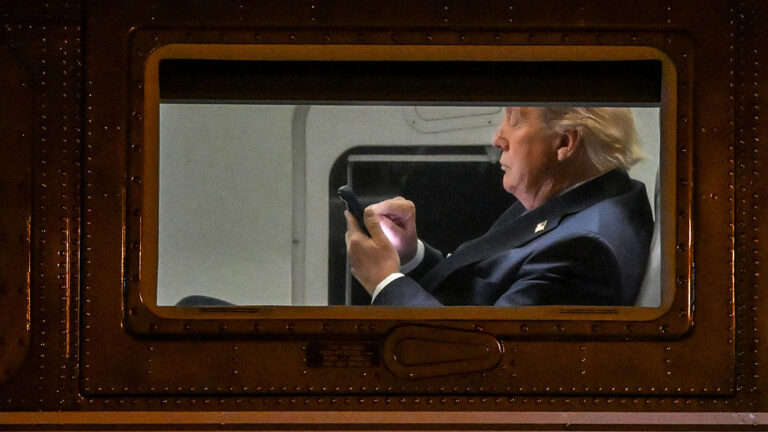The government of Prime Minister Paetongtarn Shinawatra was hanging by a thread on Thursday following the withdrawal of major coalition partner Bhumjaithai, building pressure on her to resign after just 10 months in power.
The Bhumjaithai Party withdrew from the coalition late Wednesday, citing damage caused to Thailand’s integrity, sovereignty and army after an embarrassing leak of a phone call between the premier and former Cambodian PM Hun Sen.
“I would like to apologise for the leaked audio of my conversation with a Cambodian leader which has caused public resentment,” Ms Paetongtarn told reporters at a news conference on Thursday morning, where she was joined by top defence and military officials.
“We don’t have time for infighting. We have to protect our sovereignty. The government is ready to support the military in all ways,” she said.
The premier has not commented on Bhumjaithai’s exit from the coalition led by her Pheu Thai Party.
In the leaked June 15 call, Ms Paetongtarn is heard pressing Hun Sen for a peaceful resolution to the current border dispute, and urging him not to listen to “the other side” in Thailand, including an outspoken army general who she said “just wants to look cool”.
She later told reporters that was a negotiation tactic and she had no issues with the military.
“They’re in serious trouble,” said Kevin Hewison, emeritus professor of Asian Studies at the University of North Carolina at Chapel Hill, referring to Pheu Thai. “The ultra-royalists have been handed this gift by Hun Sen, which makes the prime minister’s position really difficult.”
Bhumjaithai’s exit threatens the government’s stability, weakening the fragile coalition formed in 2023 through a deal between royalist conservatives and former Prime Minister Thaksin Shinawatra, the de facto leader of Pheu Thai.
Without Bhumjaithai, the coalition holds only a slim majority, potentially complicating the passage of key legislation, including a controversial casino legalisation bill and the next fiscal budget, when the House resumes sitting in early July.
With the exit of Bhumjaithai, the government has 261 MPs, to 234 for the opposition. The loss of another medium-sized party, such as United Thai Nation or the Democrats, would leave Ms Paetongtarn with a minority government, potentially forcing her to resign or call an election.
Both the Democrats and UTN are planning to meet later on Thursday.
If Ms Paetongtarn were to resign, parliament would need to convene to choose a new prime minister to form the next government, from a pool of only five remaining eligible candidates nominated before the 2023 election.
Another option would be to dissolve parliament and call an election, a move that could favour the opposition People’s Party, the largest force in parliament and the country’s most popular party according to opinion polls. (Story continues below)
After a stressful morning, Prime Minister Paetongtarn Shinawatra goes in search of some fresh air at a Sufficiency Economy training course offered by the 904 Volunteer School Training Centre at the 11th Infantry Regiment, Royal Guard, in Bangkok on Thursday afternoon. (Photo: @ingshin X account)
Stocks tumble
The political turmoil will weigh on foreign investors who have dumped a net 78 billion baht ($2.5 billion) worth of Thai stocks this year.
The benchmark Stock Exchange of Thailand index has slumped 23% — among the worst performers globally — so far this year, deepened by concerns that US threats of a 36% tariff would further worsen the outlook.
The index closed down 25 points (2.2%) on Thursday at 1,068.73. At this rate, it is headed for its lowest closing since March 2020, analysts noted.
“The index has been under intense pressure due to a cocktail of factors” and “the latest development could worsen the pressure,” Nirgunan Tiruchelvam, an analyst at Aletheia Capital, said prior to the market opening. “However, discerning investors should see through the crisis.”
Pheu Thai stresses unity
The Pheu Thai Party has urged Thais to support the government and stay united. “In situations like this, no force is greater than the unity of the Thai people,” it said in a statement on Wednesday night.
Krystal Tan, an economist at ANZ Group Holdings, said the political uncertainty “will further weigh on business investment, and could complicate the implementation of key economic policies at a time when the economic landscape is already very fragile and private sector growth drivers are lacking”.
Meanwhile, an anti-government group has begun to rally near Government House on Thursday to pressure Ms Paetongtarn to resign following calls by several opposition political parties to do so.
Pro-royalist activists also plan to file complaints with authorities, including police and the Election Commission, alleging violations of ethical or national security laws.
Thaksin will be seeking to shore up support for his daughter’s administration among some of the smaller opposition groups in parliament, said Hewison.
“Now she looks bad, and she can be made to look bad, and this ultra-nationalist stuff is easy to stir up,” he said.

